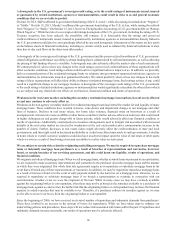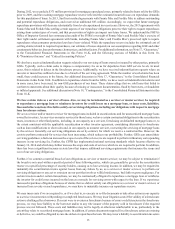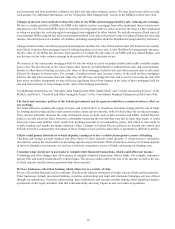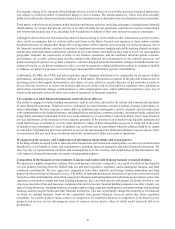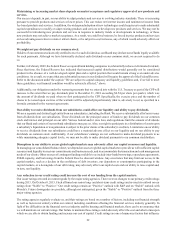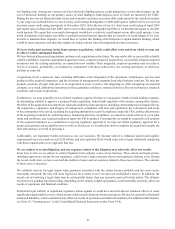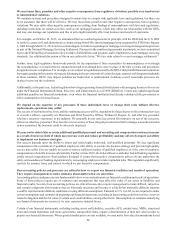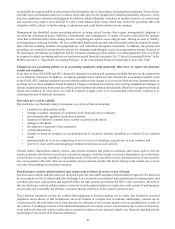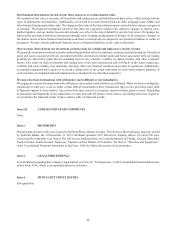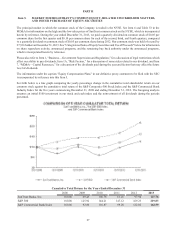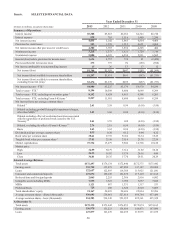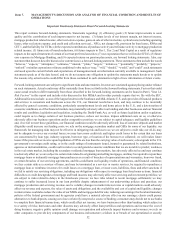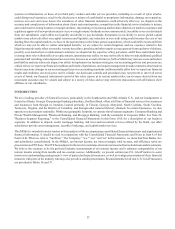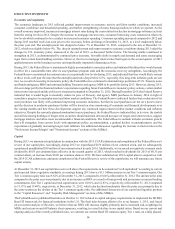SunTrust 2013 Annual Report Download - page 40
Download and view the complete annual report
Please find page 40 of the 2013 SunTrust annual report below. You can navigate through the pages in the report by either clicking on the pages listed below, or by using the keyword search tool below to find specific information within the annual report.24
We may incur fines, penalties and other negative consequences from regulatory violations, possibly even inadvertent
or unintentional violations.
We maintain systems and procedures designed to ensure that we comply with applicable laws and regulations, but there can
be no assurance that these will be effective. We may incur fines, penalties and other negative consequences from regulatory
violations. We may suffer other negative consequences resulting from findings of noncompliance with laws and regulations,
including restrictions on certain activities, such as our mortgage business, which may affect our relationship with the GSEs
and may also damage our reputation, and this in turn might materially affect our business and results of operations.
For example, on October 10, 2013, we announced that we reached agreements in principle with the HUD and the U.S. DOJ
to settle (i) certain civil and administrative claims arising from FHA-insured mortgage loans originated by STM from January
1, 2006 through March 31, 2012 and (ii) certain alleged civil claims regarding our mortgage servicing and origination practices
as part of the National Mortgage Servicing Settlement. Pursuant to the combined agreements in principle, we have committed
to provide $500 million of consumer relief, to make a $468 million cash payment, and to implement certain mortgage servicing
standards. See additional discussion of this in our earlier risk factor, "We face risks related to recent mortgage settlements."
Further, some legal/regulatory frameworks provide for the imposition of fines or penalties for noncompliance even though
the noncompliance was inadvertent or unintentional and even though there were in place at the time systems and procedures
designed to ensure compliance. For example, we are subject to regulations issued by the OFAC that prohibit financial institutions
from participating in the transfer of property belonging to the governments of certain foreign countries and designated nationals
of those countries. OFAC may impose penalties for inadvertent or unintentional violations even if reasonable processes are
in place to prevent the violations.
Additionally, in the past year, federal regulators have begun pursuing financial institutions with emerging theories of recovery
under the Financial Institutions Reform, Recovery, and Enforcement Act of 1989 (FIRREA). Courts may uphold significant
additional penalties on financial institutions, even where the financial institution had already reimbursed the government or
other counterparties for actual losses.
We depend on the expertise of key personnel. If these individuals leave or change their roles without effective
replacements, operations may suffer.
The success of our business has been, and the continuing success will be, dependent to a large degree on the continued services
of executive officers, especially our Chairman and Chief Executive Officer, William H. Rogers, Jr., and other key personnel
who have extensive experience in the industry. We generally do not carry key person life insurance on any of the executive
officers or other key personnel. If we lose the services of any of these integral personnel and fail to manage a smooth transition
to new personnel, the business could be adversely impacted.
We may not be able to hire or retain additional qualified personnel and recruiting and compensation costs may increase
as a result of turnover, both of which may increase costs and reduce profitability and may adversely impact our ability
to implement our business strategies.
Our success depends upon the ability to attract and retain highly motivated, well-qualified personnel. We face significant
competition in the recruitment of qualified employees. Our ability to execute the business strategy and provide high quality
service may suffer if we are unable to recruit or retain a sufficient number of qualified employees or if the costs of employee
compensation or benefits increase substantially. Further, in June 2010, the Federal Reserve and other federal banking regulators
jointly issued comprehensive final guidance designed to ensure that incentive compensation policies do not undermine the
safety and soundness of banking organizations by encouraging employees to take imprudent risks. This regulation significantly
restricts the amount, form, and context in which we pay incentive compensation.
Our accounting policies and processes are critical to how we report our financial condition and results of operations.
They require management to make estimates about matters that are uncertain.
Accounting policies and processes are fundamental to how we record and report our financial condition and results of operations.
Some of these policies require use of estimates and assumptions that may affect the value of our assets or liabilities and
financial results. Several of our accounting policies are critical because they require management to make difficult, subjective
and complex judgments about matters that are inherently uncertain and because it is likely that materially different amounts
would be reported under different conditions or using different assumptions. Pursuant to U.S. GAAP, we are required to make
certain assumptions and estimates in preparing our financial statements, including in determining credit loss reserves, reserves
related to litigation and the fair value of certain assets and liabilities, among other items. If assumptions or estimates underlying
our financial statements are incorrect, we may experience material losses.
Certain of our financial instruments, including trading assets and liabilities, securities AFS, certain loans, MSRs, structured
notes and certain repurchase and resale agreements, among other items, require a determination of their fair value in order to
prepare our financial statements. Where quoted market prices are not available, we may make fair value determinations based


